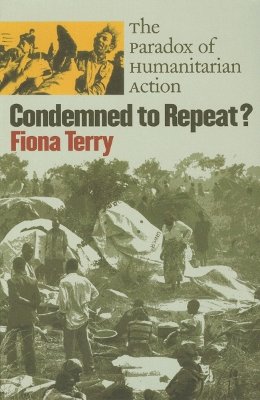
Condemned to Repeat?: The Paradox of Humanitarian Action
Fiona Terry
Humanitarian groups have failed, Fiona Terry believes, to face up to the core paradox of their activity: humanitarian action aims to alleviate suffering, but by inadvertently sustaining conflict it potentially prolongs suffering. In Condemned to Repeat?, Terry examines the side-effects of intervention by aid organizations and points out the need to acknowledge the political consequences of the choice to give aid. The author makes the controversial claim that aid agencies act as though the initial decision to supply aid satisfies any need for ethical discussion and are often blind to the moral quandaries of aid. Terry focuses on four historically relevant cases: Rwandan camps in Zaire, Afghan camps in Pakistan, Salvadoran and Nicaraguan camps in Honduras, and Cambodian camps in Thailand.
Terry was the head of the French section of Medecins sans frontieres (Doctors Without Borders) when it withdrew from the Rwandan refugee camps in Zaire because aid intended for refugees actually strengthened those responsible for perpetrating genocide. This book contains documents from the former Rwandan army and government that were found in the refugee camps after they were attacked in late 1996. This material illustrates how combatants manipulate humanitarian action to their benefit.
Condemned to Repeat? makes clear that the paradox of aid demands immediate attention by organizations and governments around the world. The author stresses that, if international agencies are to meet the needs of populations in crisis, their organizational behavior must adjust to the wider political and socioeconomic contexts in which aid occurs.
Product Details
About Fiona Terry
Reviews for Condemned to Repeat?: The Paradox of Humanitarian Action
G. John Ikenberry
Foreign Affairs
Noting that governments have various nonhumanitarian policies that are manifested in dealing with refugee flows, including allowing refugee camps to be used for military purposes, Terry concludes that aid agencies must necessarily contribute to these governmental maneuvers.... She concludes that the best aid agencies can do in the real world of governmental realpolitik is to try to minimize undesirable political impact that inheres in humanitarian assistance.
Choice
Terry has written a compelling book about the failure of international humanitarian organizations to take into consideration a wider political context before providing aid.... In clear and concise analysis, she begins with the controversial claim that the aid agencies respond in knee-jerk fashion to any conflict without further investigating or even considering the ramifications of their aid.
Library Journal
The book makes a valuable contribution to the burgeoning literature on humanitarian action. The historical research is detailed, the arguments are cogent and precise, and Terry's findings are alarmingly relevant.... Although the book is an appeal to relief agencies to enter into emergency situations with more caution and greater awareness of the ramifications of their actions, the study would certainly serve as a valuable pedagogical tool for graduate courses. It is also accessible to undergraduates and a general adult reading audience.
Eric A. Heinze
Perspectives on Political Science
This is a provocative, analytical treatment of the inevitable dilemmas that arise when humanitarian action is undertaken in a militarized environment. Fiona Terry writes with the authority that comes from several years of working in emergency relief programs in different parts of the world. The book's main contribution is its identification, discussion, and analysis of the predictable negative consequences of humanitarian intervention.
David L. Cingranelli
Perspectives on Politics
